“A heavy period is when you lose lots of blood each period.
The amount of bleeding can change
at different life stages”.1
Umbrella
What may the Periods and Heavy Bleeding Umbrella include?
Depending on the Source (DotS) this Umbrella may include:
- Dysfunctional Uterine Bleeding
- Heavy Bleeding
- Heavy Menstrual Bleeding
- Heavy Periods
- Heavy Uterine Bleeding
- Menorrhagia
Heavy Menstrual Bleeding
What is heavy menstrual bleeding?
DotS the definition of heavy menstrual bleeding may vary. The (Australian) Jean Hailes for Women’s Health’s (JH) definition is:
“A heavy period is when you lose lots of blood each period. The amount of bleeding can change at different life stages. For example, in teenage years or before menopause (your last period). Heavy periods are common in women aged 30 to 50”.2
Menorrhagia
What is menorrhagia?
DotS the definition of menorrhagia may vary. The (United States) Centers for Disease Control’s (CDC) definition is:
“Heavy menstrual bleeding, or menorrhagia, is menstrual bleeding (your period) that is very heavy during your period. It can be menstrual bleeding that lasts more than 7 days”.3
The (United States) Mayo Clinic’s definition is:
“Some women have menstrual bleeding that is heavy or lasts for more than a few days. This condition used to be called menorrhagia. Heavy menstrual bleeding is a common concern. But most women don’t have enough blood loss for it to be called heavy menstrual bleeding”.4
Heavy or Not
How heavy is heavy menstrual bleeding?
In Bleeding Disorders In Women: About Heavy Menstrual Bleeding – Signs and Symptoms the CDC explain:
- Need to change your tampon or pad after less than 2 hours
- Have a menstrual flow that soaks through one or more pads or tampons every hour for several hours in a row
- Need to double up on pads to control your menstrual flow
- Need to change pads or tampons during the night
- Have menstrual periods lasting more than 7 days
- Have a menstrual flow with blood clots the size of a quarter or larger
- Have a heavy menstrual flow that keeps you from doing the things you would do normally
- Have constant pain in the lower part of the stomach during your periods
- Are tired, lack energy, or are short of breath.
If you have this type of bleeding, you should see a healthcare provider”.5
In Heavy Periods: How Do You Know If You Have Heavy Periods? the JH note:
- Your bleeding can’t be contained with a pad or tampon
- You need to change your pad or tampon every two hours or less
- You need to change your pad overnight
- You notice blood clots that are bigger than a 50-cent coin
- Your period lasts more than seven to eight days
- Your periods stop you from doing things you normally do”.6
Cause
What causes heavy menstrual bleeding?
In Heavy Periods: Causes of Heavy Periods the (United Kingdom) NHS elaborate on:
They can sometimes be heavy at different times, like when you first start your periods, after pregnancy or during menopause.
Sometimes, they can be caused by:
- Conditions affecting your womb, ovaries or hormones, such as polycystic ovary syndrome, fibroids, endometriosis and pelvic inflammatory disease
- Some medicines and treatments, including some anticoagulant medicines and chemotherapy medicines
- Stress and depression
Rarely, heavy periods can be a sign of womb cancer”.7
In Menorrhagia (Heavy Menstrual Bleeding): Symptoms & Causes – Causes the Mayo Clinic elaborate on:
- Hormone imbalance…
- Dysfunction of the ovaries…
- Uterine fibroids…
- Polyps…
- Adenomyosis…
- Intrauterine device (IUD)…
- Pregnancy complications…
- Cancer…
- Inherited bleeding disorders…
- Medications…
- Other medical conditions…”.8
Common or Not
How common is heavy menstrual bleeding?
According to the JH:
 “About one in four women have heavy periods (heavy menstrual bleeding)”.9
“About one in four women have heavy periods (heavy menstrual bleeding)”.9
Bleeding Disorder
Is there an association between a bleeding disorder and heavy menstrual bleeding?
In Bleeding Disorders the Office on Women’s Health, United States Department of Health and Human Services, Womenshealth.gov quote the 2001 data:
“As many as one in 10 women with heavy menstrual periods may have a bleeding disorder”.10
Treatment
What are treatment options for heavy menstrual bleeding?
On page two in Heavy Periods: Treatment the (British) Women’s Health Concern elaborate on:
“Treatment options depend on the type and duration of abnormal bleeding, the presence of specific disease or condition, your age, and desire for further pregnancies. Treatment can be medical or surgical”.11
In Bleeding Disorders In Women: Heavy Menstrual Bleeding –- Treatment and Recovery the CDC elaborate on different types of treatment and note:
“The type of treatment you get will depend on the cause of your bleeding and how serious it is. Your healthcare provider also will look at things such as your age, general health, and medical history; how well you respond to certain medicines, procedures, or therapies; and your wants and needs”.12
Look for A Pattern
Can it be helpful to record period dates and symptoms?
In Heavy Periods the (Scottish) NHS Inform explain:
If you’re seeing your doctor, there are some useful pieces of information to think about beforehand:
- The first day of your last period (when it started)
- How many days your period usually lasts
- What was the shortest time between your periods (from the first day of one period to the first day of the next)
- What was the longest time between your periods (from the first day of one period to the first day of the next)
- How often you need to change your period products on a heavy day
- If you are over 25, when you had your last smear test”.13
Health Care Provider
What if I have heavy menstrual bleeding?
If you have heavy menstrual bleeding, it may be in your best interest to choose to talk to your health care provider about this. In Heavy Menstrual Bleeding (Menorrhagia): Living With – When Do You Call Your Healthcare Provider If You Suspect Heavy Period Bleeding? the (United States) Cleveland Clinic explain:
You should also schedule an appointment if you notice that you’re having to double up on menstrual products or if you’re skipping activities you enjoy when you’re on your period”.14
The Mayo Clinic also note:
- Vaginal bleeding so heavy it soaks at least one pad or tampon an hour for more than two hours in a row
- Bleeding between periods or irregular vaginal bleeding
- Vaginal bleeding after menopause”.15
Health Topics A-Z
Where may I find Health Topics A-Z related to Periods and Heavy Bleeding?
In Health Topics A-Z you may find:
Links
Where may I find Links related to Periods and Heavy Bleeding?
Your Country may have Links similar to:
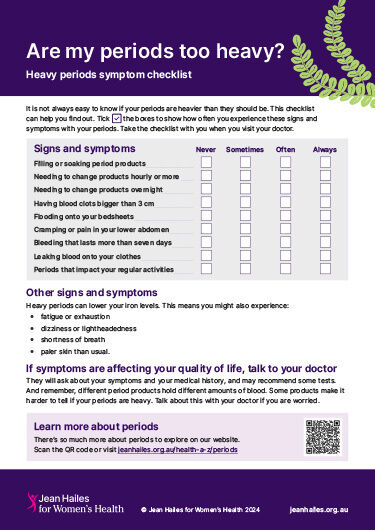
Links
This Links List to third party websites is neither comprehensive nor exhaustive. Inclusion on this Links List does not imply endorsement or recommendation. Non-inclusion on this Links List does not imply non-endorsement or non-recommendation. Third party websites are not under the control of Meno Martha International Menopause Directory. Third party websites may contain explicit medical images and/or sexual references. Please read Meno Martha International Menopause Directory’s Links Policy before proceeding to a Link. Please contact Webmaster if you experience a problem with a Link.New or Updated
- Consumer Video and Podcast Series: 2025 Consumer Videos and Podcasts – Abnormal Uterine Bleeding—When To See A Clinician [06 June 2025]
- Heavy Periods Symptom Checklist: Are My Periods Too Heavy?
- Heavy Periods: Signs and Treatment | NHS [May 2025]
- How To Talk To Your Doctor About Heavy Periods [21 August 2025]
- “Just a period” [+ Video: Ever Been Told That It’s “Just a period?”]
- Period Symptom Checker

- Abnormal Uterine Bleeding
- About the Menstrual Cycle [+ Video]
- About the Menstrual Cycle: When To See Your Doctor
- Adenomyosis
- Adenomyosis and Heavy Bleeding
- BMS TV: HRT and Bleeding
- Bleeding Disorders
- Bleeding Disorders A-Z
- Bleeding Disorders In Women
- Bleeding Disorders In Women: About Bleeding Disorders In Women
- Bleeding Disorders In Women: About Heavy Menstrual Bleeding – Testing and Diagnosis: Menstrual Chart & Scoring System
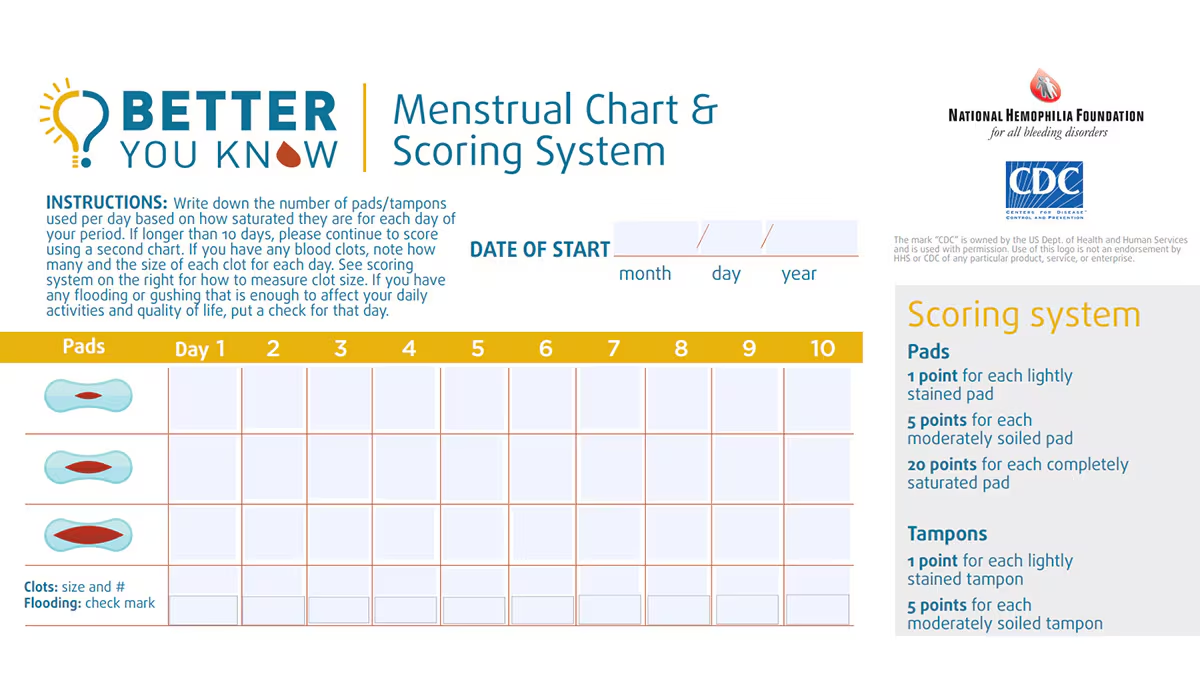
- Bleeding Disorders In Women: Signs and Symptoms of Bleeding Disorders In Women
- Bleeding During Menopause | Dr Louise Newson
- Blood Clots During Menstruation: A Concern?
- Consumer Video and Podcast Series: 20234 Consumer Videos and Podcasts – Preparing for Your Menopause Health Care Visit
- Consumer Video and Podcast Series: 2025 Consumer Videos and Podcasts – Abnormal Uterine Bleeding—When To See A Clinician
- Dilation and Curettage (D&C)
- Endometrial Ablation
- Endometrial Ablation
- Endometriosis
- Everything You Should Know About Menometrorrhagia
- FAQs: Abnormal Uterine Bleeding
- FAQs: Dilation and Curettage (D&C)
- FAQs: Dysmenorrhea: Painful Periods
- FAQs: Endometrial Ablation
- FAQs: Endometriosis
- FAQs: Heavy Menstrual Bleeding
- Healthy Habits: Menstrual Hygiene
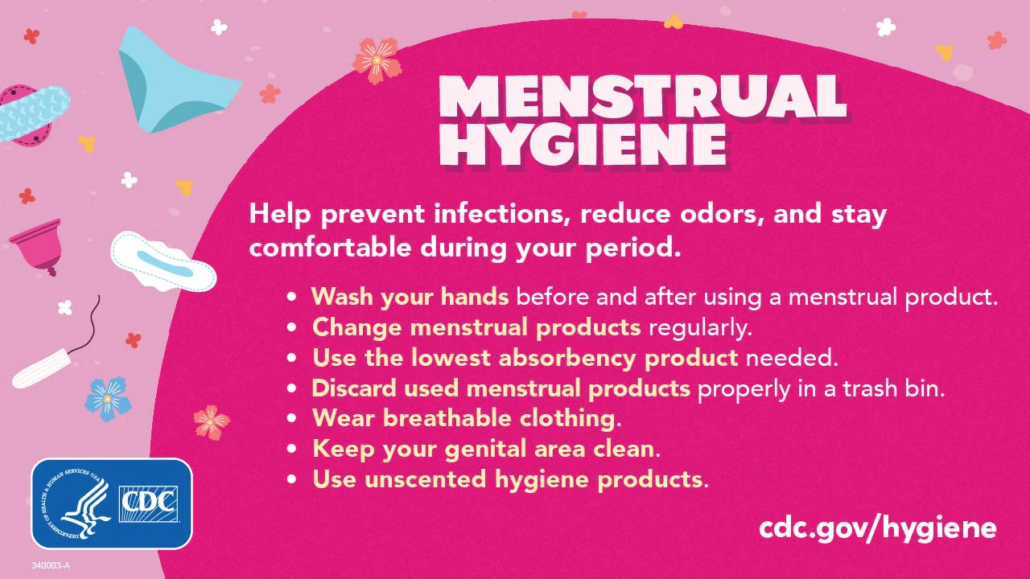
- Heavy Menstrual Bleeding
- Heavy Menstrual Bleeding (Menorrhagia)
- Heavy Menstrual Bleeding (Menorrhagia): Diagnosis and Tests
- Heavy Menstrual Bleeding (Menorrhagia): Management and Treatment
- Heavy Menstrual Bleeding: Diagnosis & Treatment
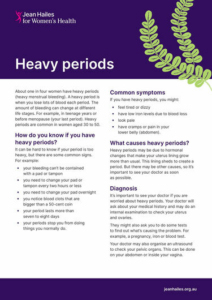 Heavy Menstrual Bleeding: Symptoms & Causes
Heavy Menstrual Bleeding: Symptoms & Causes- Heavy Periods
- Heavy Periods
- Heavy Periods
- Heavy Periods
- Heavy Periods Fact Sheet
- Heavy Periods Symptom Checklist: Are My Periods Too Heavy?
- Heavy Periods (Menorrhagia)
- Heavy Periods: Can Folic Acid Help?
- Heavy Periods: How Much Is Heavy Bleeding? Heavy Periods Self-Assessment
- Heavy Periods: Signs and Treatment | NHS
- Home Remedies: Managing Menstrual Cramps
- How Does the Mirena Coil Affect Menopause?
- How To Talk To Your Doctor About Heavy Periods
- Just A Period – Let’s Talk Heavy And Painful Periods Webinar
- “Just a period” [+ Video: Ever Been Told That It’s “Just a period?”]
- Mayo Clinic Q and A: Menstrual Cups — Why the Recent Increase In Popularity?
- Menometrorrhagia
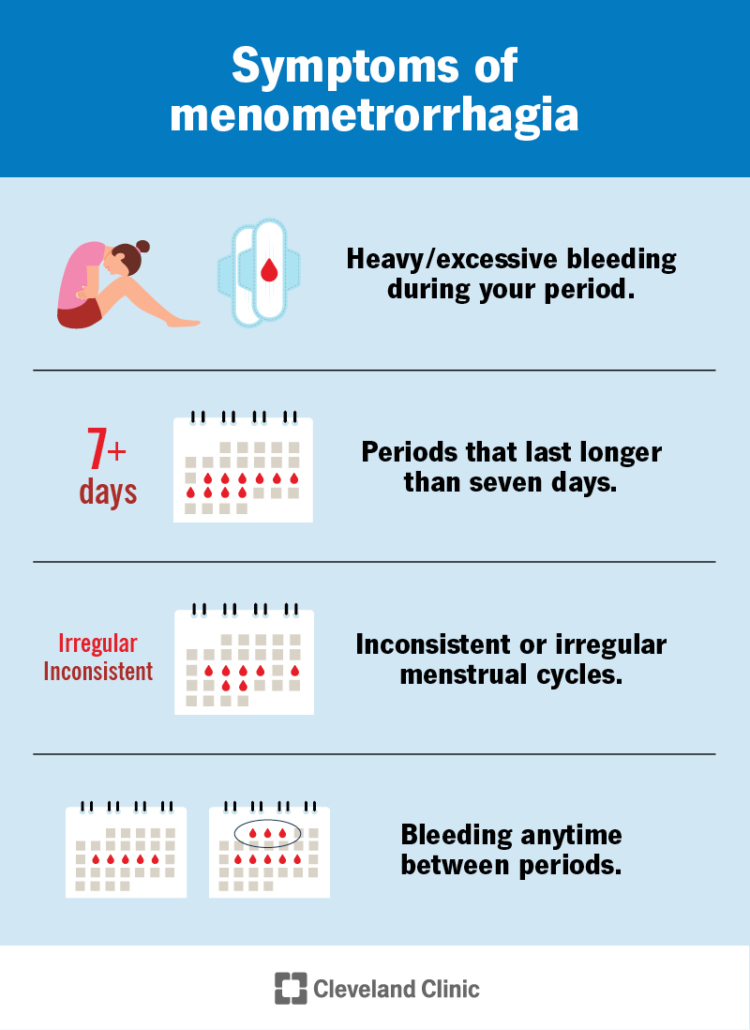
- Menopause
- Menopause Checklist Podcast: Episode 2: Bye Bye Periods
- Menopause Map: Downloadable Resources – My Personal Path Print Tools: Symptom Tracker
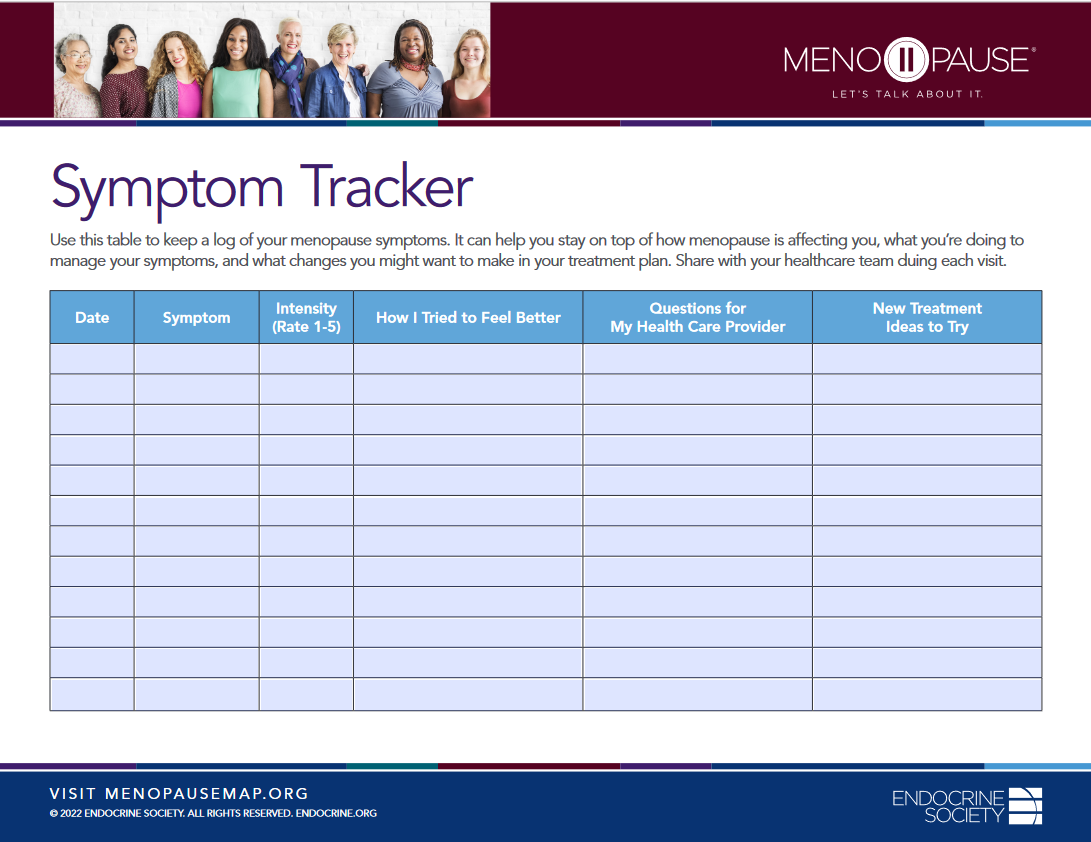
- Menopause Patient Information [Videos] 2. Talking To Your GP About Menopause
- Menstrual Calendar
- Menstrual Calendar: Calendario Menstrual [Spanish]
- Menstrual Calendar: Calendrier Menstruel [French]
- Menstrual Cycle
- Menstrual Cycle: What’s Normal, What’s Not
- Menstrual Cycle: What’s Normal, What’s Not – How Can I Track My Menstrual Cycle?
- Menstrual Diary
- Menstrual Hygiene Day [28 May]
- National Women’s Health Week: Day 4 – May 15: Talk About It—Reducing Women’s Health Stigma
- Navigating Menopause: Expert Insights and Solutions | Dr Susan Davis | The Proof Podcast EP 245
- Perimenopausal and Postmenopausal Bleeding
- Perimenopause
- Perimenopause and Menopause Checklist: Translated Checklists
- Perimenopause and Menopause Symptom Checklist

- Perimenopause: How do I know if changes in my periods are normal perimenopausal symptoms or something to be concerned about?
- Period Problems: Heavy Bleeding
- Period Products
- Period Symptom Checker

- Periods
- Periods
- Periods (Menstruation) [Other Languages and Formats]
- Periods (Menstruation) Videos
- Periods (Menstruation) [Other Languages and Formats]: Menstrual Health Symptom Questionnaire
- Periods Information Hub
- Periods and Heavy Bleeding – Easy Read
- Periods – Menstrual Cycle: Animation [Video]
- Periods: Period Problems
- Tips for Tracking Your Bleeding
- Tricky Periods: What’s ‘Normal’ and What’s Not
- Uterine Cancer Awareness
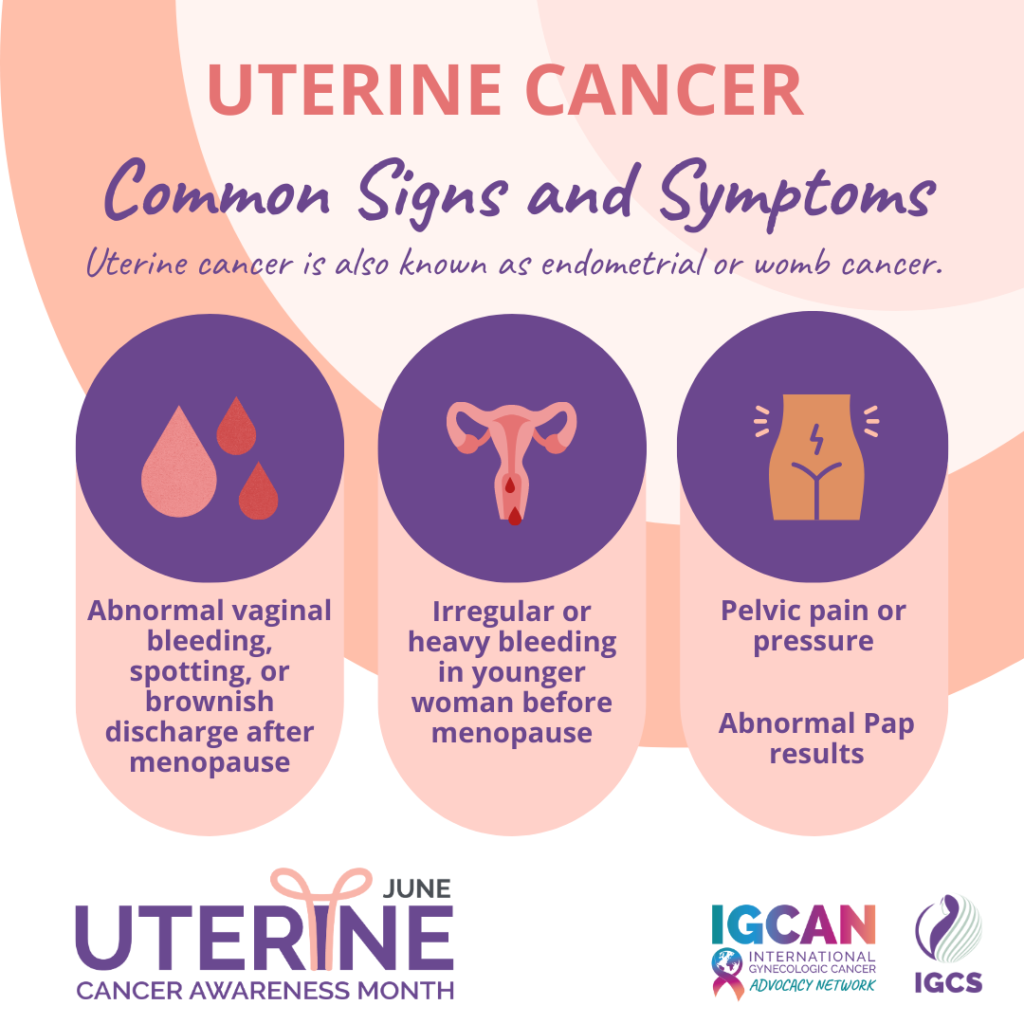
- Uterine/Endometrial Cancer/GTD
- Vaginal Bleeding
- Vaginal Bleeding
- Victoryforwomen.org [Victory For Women, National Bleeding Disorders Foundation]
- Videos and Podcasts: Videos – Interviews: Menopause and Abnormal Bleeding
- Von Willebrand Disease
- Von Willebrand Disease (VWD)
- What Are Heavy Periods?
- What Causes Bleeding Between Periods?
- What Is A Menstrual Cycle?
- What Is A Period?
- Why Is Bleeding So Heavy? [Video]
- World GO Day [World Gynecologic Oncology Day, 20 September]

- Your Menstrual Cycle
- Your Period
Sources
Where may I find the Sources quoted?
You may find the Sources quoted at:
Sources
- Heavy Periods. Updated: April 2024. Jean Hailes for Women’s Health https://www.jeanhailes.org.au/resources/heavy-periods Accessed: 22 October 2025
- Heavy Periods. Updated: April 2024. Jean Hailes for Women’s Health https://www.jeanhailes.org.au/resources/heavy-periods Accessed: 22 October 2025
- Bleeding Disorders In Women: About Heavy Menstrual Bleeding – What It Is. 15 May 2024. Centers for Disease Control and Prevention https://www.cdc.gov/female-blood-disorders/about/heavy-menstrual-bleeding.html Accessed: 22 October 2025
- Heavy Menstrual Bleeding: Symptoms & Causes – Overview. 30 August 2023. Mayo Clinic https://www.mayoclinic.org/diseases-conditions/menorrhagia/symptoms-causes/syc-20352829 Accessed: 22 October 2025
- Bleeding Disorders In Women: About Heavy Menstrual Bleeding – Signs and Symptoms. 15 May 2024. Centers for Disease Control and Prevention https://www.cdc.gov/female-blood-disorders/about/heavy-menstrual-bleeding.html Accessed: 22 October 2025
- Heavy Periods: How Do You Know If You Have Heavy Periods? Updated: April 2024. Jean Hailes for Women’s Health https://www.jeanhailes.org.au/resources/heavy-periods Accessed: 22 October 2025
- Heavy Periods: Causes of Heavy Periods. Page Last Reviewed: 19 September 2024. NHS https://www.nhs.uk/conditions/heavy-periods/#what-causes-heavy-periods Accessed: 22 October 2025
- Heavy Menstrual Bleeding: Symptoms & Causes – Causes. 30 August 2023. Mayo Clinic https://www.mayoclinic.org/diseases-conditions/menorrhagia/symptoms-causes/syc-20352829 Accessed: 22 October 2025
- Heavy Periods. Updated: April 2024. Jean Hailes for Women’s Health https://www.jeanhailes.org.au/resources/heavy-periods Accessed: 22 October 2025
- Bleeding Disorders. Page Last Updated: February 22, 2021. Office on Women’s Health, United States Department of Health and Human Services, Womenshealth.gov https://www.womenshealth.gov/a-z-topics/bleeding-disorders Accessed: 22 October 2025
- Heavy Bleeding: Treatment. Publication Date: November 2022:2. British Women’s Health Concern https://www.womens-health-concern.org/help-and-advice/factsheets/heavy-periods/ Accessed: 22 October 2025
- Bleeding Disorders In Women: Heavy Menstrual Bleeding – Treatment and Recovery. 15 May 2024. Centers for Disease Control and Prevention https://www.cdc.gov/female-blood-disorders/about/heavy-menstrual-bleeding.html Accessed: 22 October 2025
- Heavy Periods: When To Get Medical Advice. Last Updated: 11 April 2025. NHS Inform https://www.nhsinform.scot/healthy-living/womens-health/girls-and-young-women-puberty-to-around-25/periods-and-menstrual-health/heavy-periods/ Accessed: 22 October 2025
- Heavy Menstrual Bleeding (Menorrhagia): Living With – When Do You Call Your Healthcare Provider If You Suspect Heavy Period Bleeding? Last Reviewed: 01 July 2024. Cleveland Clinic. https://my.clevelandclinic.org/health/diseases/17734-menorrhagia-heavy-menstrual-bleeding Accessed: 22 October 2025
- Heavy Menstrual Bleeding: Symptoms & Causes – Symptoms: When To See A Doctor. 30 August 2023. Mayo Clinic https://www.mayoclinic.org/diseases-conditions/menorrhagia/symptoms-causes/syc-20352829 Accessed: 22 October 2025







